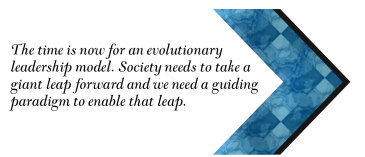What is Ubuntu Leadership?
Ubuntu is a humanistic philosophical concept that is rooted in the history of Africa and is also found in many indigenous cultures of South Africa. The word Ubuntu means “humanity” and at the heart of this emerges the idea that “an individual learns to be a person through other people.” The values embedded within this ethic of South Africa are universal and of vital importance to the contemporary world we live in, and has significant implications for 21st century leadership. The word Ubuntu was popularized by Archbishop Desmond Tutu and Nelson Mandela in the 1990's as they compared apartheid, which means literally to be “separate” to Ubuntu, which in the African conception states that “persons depend on persons to be persons.” It is by belonging to the community that we become ourselves.
 This idea aligns well with emerging leadership styles that focus on leading through collaboration rather than isolation. Tutu says that Ubuntu speaks to your essence as a human being, thus we cannot exist as humans in isolation, nor work alone as leaders, but must lead with interconnectedness.
This idea aligns well with emerging leadership styles that focus on leading through collaboration rather than isolation. Tutu says that Ubuntu speaks to your essence as a human being, thus we cannot exist as humans in isolation, nor work alone as leaders, but must lead with interconnectedness.
The concept of Ubuntu was articulated in Ambassador Elizabeth Bagley's (Secretary of State's Special Representative for Global Partnership) swearing-in speech where she said, “In understanding the responsibilities that come with our interconnectedness, we realize that we must rely on each other to lift our world from where it is now to where we want it to be in our lifetime, while casting aside our worn out preconceptions, and our outdated modes of statecraft. This is the place where we all belong as partners, where we all participate as stakeholders, and where we all succeed together, not incrementally but exponentially.”
We maintain that the concept of Ubuntu needs to apply to personal, professional, organizational, and governmental leadership.
Components of Ubuntu Leadership
- Offers an understanding of leadership in relation with the world.
- Exudes principles of caring for each other's well-being and a spirit of mutual support.
- Moves away from the "us and them" mentality so prevalent in politics, corporations, and traditionally led organizations.
Evolutionary Leadership focuses on a way of being, perceiving, and acting in the world. Evolutionary leaders see the importance of facilitating society's evolution toward economic, social, and environmental sustainability. Evolutionary leaders foster collaboration among all three sectors.
Components of Evolutionary Leadership
We have a responsibility and a choice about the kind of future that we want to see emerge.
- Stewards of people, organizations, communities, and ecosystems.
- Seek to facilitate emergence of life-affirming, future oriented and opportunity increasing possibilities.
- Contributes to the idea of deliberate, intentional, and conscious change of shaping a better world.
Why Ubuntu Leadership?
 In the leadership context, first we had cooperation and then collaboration. So, what is next? We maintain the answer is the ultimate value-driven leadership concept: Ubuntu. This is an evolutionary leadership concept for the next decade and beyond, but it is rooted deep in ancient African wisdom. The word Ubuntu essentially means “I am because you are” and was popularized by Archbishop Desmond Tutu and Nelson Mandela in the 1990’s. Tutu says that Ubuntu speaks to your essence as a human being. And he indicates that we cannot exist as humans in isolation therefore, Ubuntu is about interconnectedness.
In the leadership context, first we had cooperation and then collaboration. So, what is next? We maintain the answer is the ultimate value-driven leadership concept: Ubuntu. This is an evolutionary leadership concept for the next decade and beyond, but it is rooted deep in ancient African wisdom. The word Ubuntu essentially means “I am because you are” and was popularized by Archbishop Desmond Tutu and Nelson Mandela in the 1990’s. Tutu says that Ubuntu speaks to your essence as a human being. And he indicates that we cannot exist as humans in isolation therefore, Ubuntu is about interconnectedness.In this training, we will look at how we currently frame leadership and how this paradigm transcends existing views. We will then examine the benefits to employing this paradigm and specifically how we can incorporate it into our own leadership.
We cannot continue to try and live in a world that does not make sense. We owe it to ourselves, our future generations, and our world partners to begin this process. We must begin to use the Ubuntu filter in all categories of our lives; the future depends on it.
